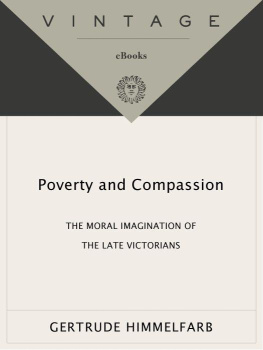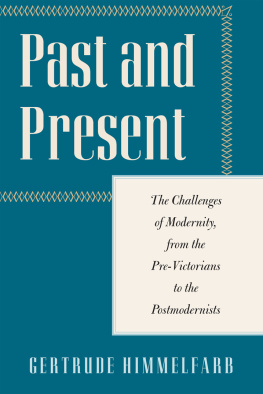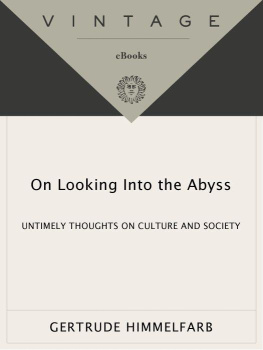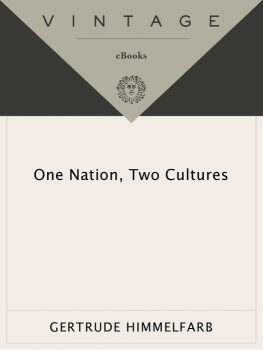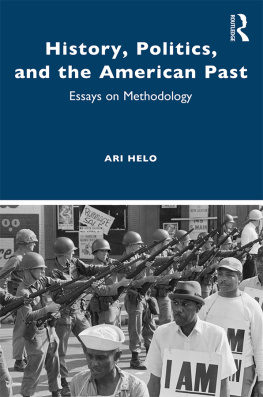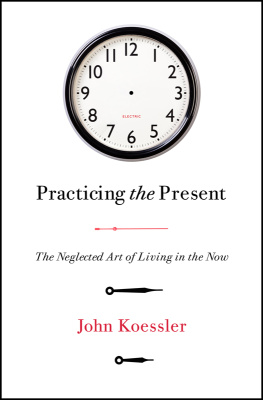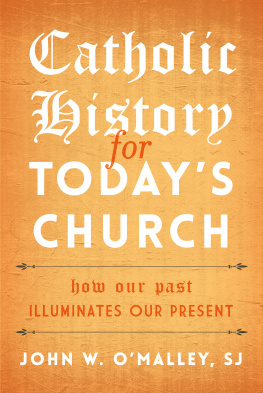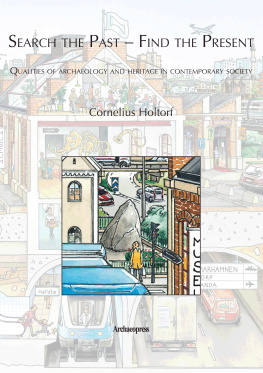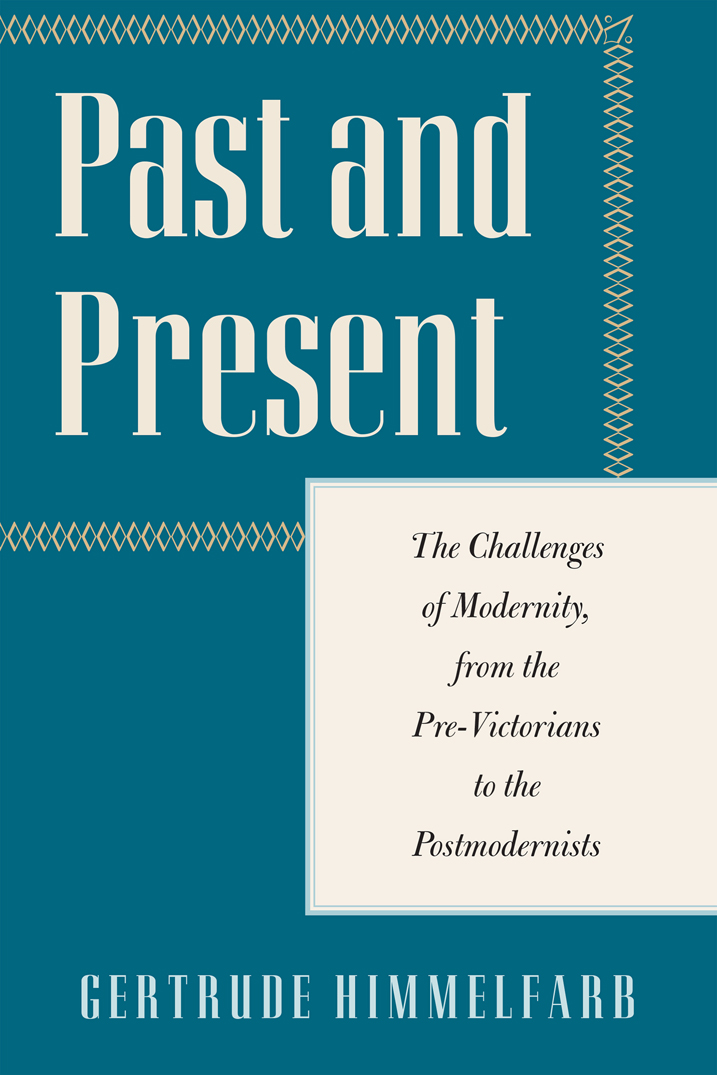


2017 by Gertrude Himmelfarb
All rights reserved. No part of this publication may be reproduced, stored in a retrieval system, or transmitted, in any form or by any means, electronic, mechanical, photocopying, recording, or otherwise, without the prior written permission of Encounter Books, 900 Broadway, Suite 601, New York, New York, 10003.
First American edition published in 2017 by Encounter Books, an activity of Encounter for Culture and Education, Inc., a nonprofit, tax exempt corporation.
Encounter Books website address: www.encounterbooks.com
The paper used in this publication meets the minimum requirements of ANSI/NISO Z39.481992 (R 1997) (Permanence of Paper).
FIRST AMERICAN EDITION
LIBRARY OF CONGRESS CATALOGING-IN-PUBLICATION DATA
Names: Himmelfarb, Gertrude, author.
Title: Past and present: the challenges of modernity, from the pre-Victorians to the postmodernists / by Gertrude Himmelfarb.
Description: New York: Encounter Books, 2017. | Includes bibliographical references and index.
Identifiers: LCCN 2016040459 (print) | LCCN 2017000061 (ebook) | ISBN 9781594039263 (Ebook)
Subjects: LCSH: HistoryPhilosophy. | Knowledge, Theory of. | TruthPhilosophy. | BISAC: POLITICAL SCENCE / Essays.
Classification: LCC D16.8.H6237 2017 (print) | LCC D16.8 (ebook) | DDC 901dc23
LC record available at https://lccn.loc.gov/2016040459
Table of Contents
Guide
CONTENTS


A WISE HISTORIAN and a good friend, the late J. H. Hexter, recalling the impassioned political views of some of his colleagues, told me that he did not share their concerns only because he did not have the time or mind for them. Apart from family and friends, he explained, he spent most of his waking hours teaching, reading, and writing about Tudor and Stuart England. He knew more about the relations of the royalty and nobility than about Congress and the president, was more familiar with the Elizabethan Poor Laws than with the American system of social security, was more involved in the debate over the rise and decline of the gentry than the rise and decline of the proletariat. Immersed in the past, he did not have to be cautioned against the Whig fallacy: interpreting the past in terms of the present, imposing the values of an enlightened, progressive present upon a benighted, retrograde past. Had he ever been tempted to write about the present, he might have been inclined to reverse that order, imposing the values and perhaps virtues of the past upon the present.
That, indeed, is my temptation. More mindful of the present than my friend, I am sufficiently stimulated by the past to relate it to the present. Most of these essays were written a decade or two ago, but the earliest of them, dating back more than half a century, sets the theme for the others. The quarrel between ancients and moderns, memorialized by Leo Strauss, can be applied to history as well as philosophy. Just as a philosopher today may look to the classics for the enduring truths of humanity, so a historian may find that his past, the period in which he is professionally engrossed, resonates in his own present, the period in which he happens to live. In the same spirit, William Jamess once-born / twice-born adage may be given a larger latitude. Normally confined to the realm of religion, it may be extended to history to the historian who finds in his study of the past something like a rebirth, a new perspective on the present.
In one way or another, to one degree or another, the essays have the same effect, setting past and present in an active, sometimes adversary relationship to each other. The American War on Terror provoked by the 9/11 attack recalls Edmund Burkes war against the Reign of Terror launched by the French Revolution. The contrast between those wars, the one pursued resolutely by Burke and the other irresolutely by America, may be seen as an object lesson in history, pitting past against present in this instance, to the credit of the past.
So, too, Matthew Arnolds defense of high culture, the best which has been thought and said, as opposed to the anarchy of liberalism that recognizes no principle except doing as one likes, may be read today as a critique of the even more anarchic, unprincipled culture of our own day. Walter Bagehots analysis of the efficient English constitution unified by a single sovereign authority, unlike the American Constitution where authority is divided by the separation of powers, may be challenging to the new constitution makers, who have to decide between the English and American models. T. H. Huxleys tract on evolution and ethics in effect, evolution versus ethics is more pertinent than ever, as the advocates of scientism make even larger claims for evolution in particular and science in general.
The final section, Of This Time, Of That Place (the title courtesy of Lionel Trilling) reminds us of some of the other tensions besetting modernity. The democratic disorders of our time are notably different from those experienced by the Founding Fathers and are even more resistant to the democratic remedies envisaged by them. If the hard facts and statistics compiled only two decades ago about family dissolution and welfare dependency, crime and violence, drug addiction and pornography have to be updated, it is only for the worse. And if the relations between civil society and the state seemed problematic then, subverting our traditional ideas about the love of country, they are more so today.
The last (and most recent) essay suggests how far we have come, from a postmodernism that has transformed academia, deconstructing and problematizing one discipline after another, to a transgenderism that deconstructs and problematizes humanity itself our physical and social as well as spiritual and moral nature. Having denied the factuality (facticity, as is now said pejoratively) of objectivity and truth, the post-postmodernist denies reality in all its dimensions. As the events of the past are only social constructs invented by the historian, or the poem only a text essentially created by the reader or literary critic, so the present exists only problematically and purposelessly, without substance or reality, to be created or recreated at will.
In this state of cultural and social anarchy (Arnolds word is more apt today than it was then), we may be inspired by the visionaries and provocateurs revisited here. The final word may rest with Lionel Trilling, one of the most eminent of our latter-day mentors. Trilling recalls us to the principle that may still liberate and restore us the idea of truth. In the face of the certainty that the effort of objectivity will fall short of what it aims at, those who undertake to make the effort do so out of something like a sense of intellectual honor and out of the faith that in the practical life, which includes the moral life, some good must follow from even the relative success of the endeavor.


